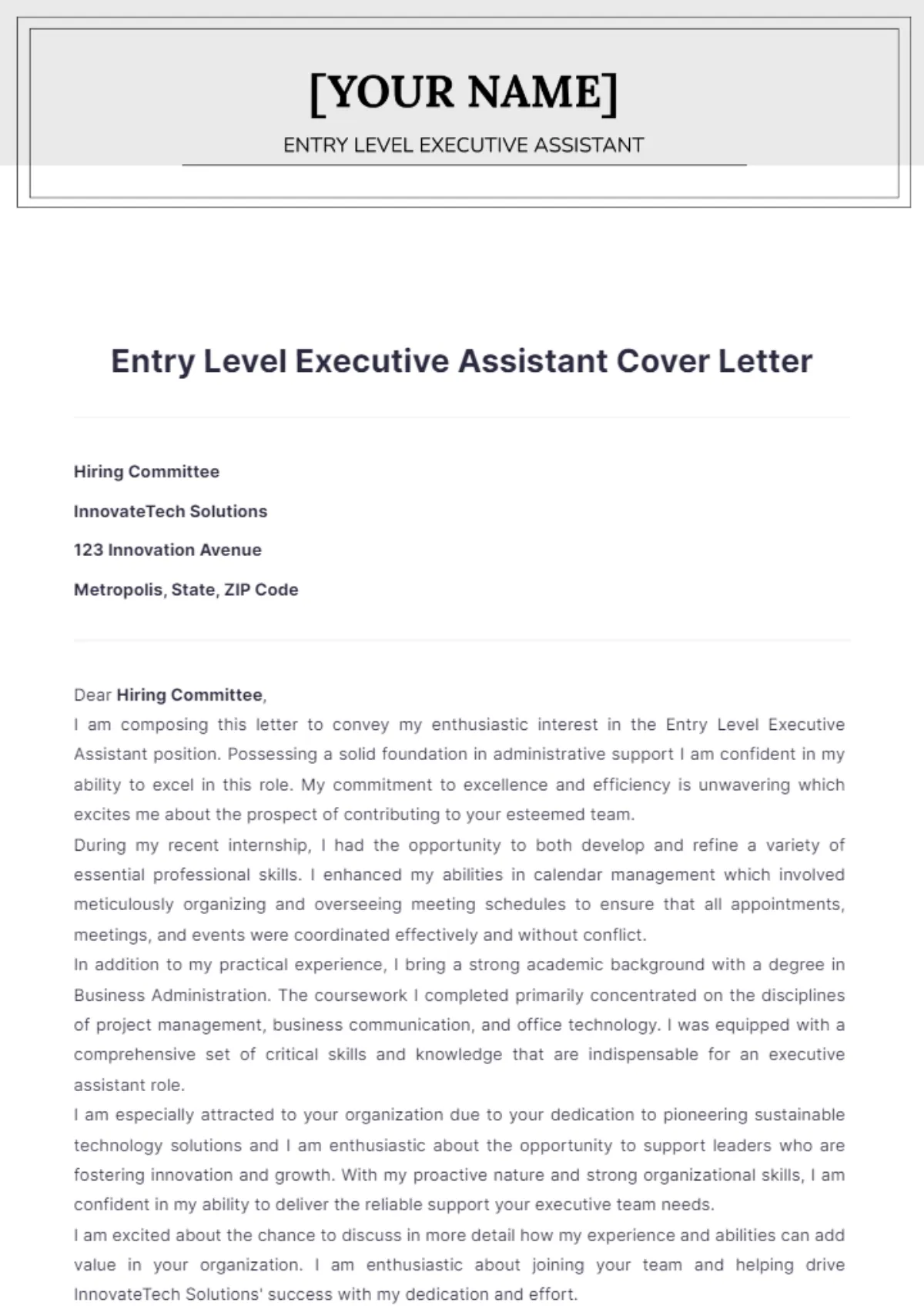What Is an Entry Level Executive Assistant?
An Entry Level Executive Assistant (EA) provides crucial support to executives and other high-level professionals within a company. This role is often the starting point for a career in administrative support, offering opportunities to develop essential skills and gain valuable experience. Entry-level EAs are typically responsible for managing schedules, coordinating meetings, handling correspondence, and performing various administrative tasks. The work is dynamic, demanding strong organizational skills, attention to detail, and the ability to prioritize multiple tasks. They often serve as a primary point of contact, interacting with internal and external stakeholders and maintaining a professional and efficient office environment. The role requires proactive problem-solving, excellent communication, and a willingness to learn and adapt to changing priorities. It’s a stepping stone to more senior administrative positions, as well as other career paths within the organization, making it a good position for individuals looking to build their professional experience.
Key Skills for an Entry Level EA
To excel as an Entry Level Executive Assistant, several key skills are necessary. These abilities are the cornerstone of efficient performance and professional success. Strong communication skills, both written and verbal, are essential for interacting with executives, colleagues, and clients. The ability to convey information clearly and concisely, as well as actively listen and understand instructions, is vital. Organizational skills are equally critical; EAs must manage schedules, coordinate meetings, and handle multiple tasks simultaneously. Attention to detail ensures accuracy in all tasks, from managing calendars to preparing documents. Time management skills are also imperative, requiring the ability to prioritize tasks, meet deadlines, and work efficiently. These skills contribute to a productive and well-managed work environment.
Communication Proficiency
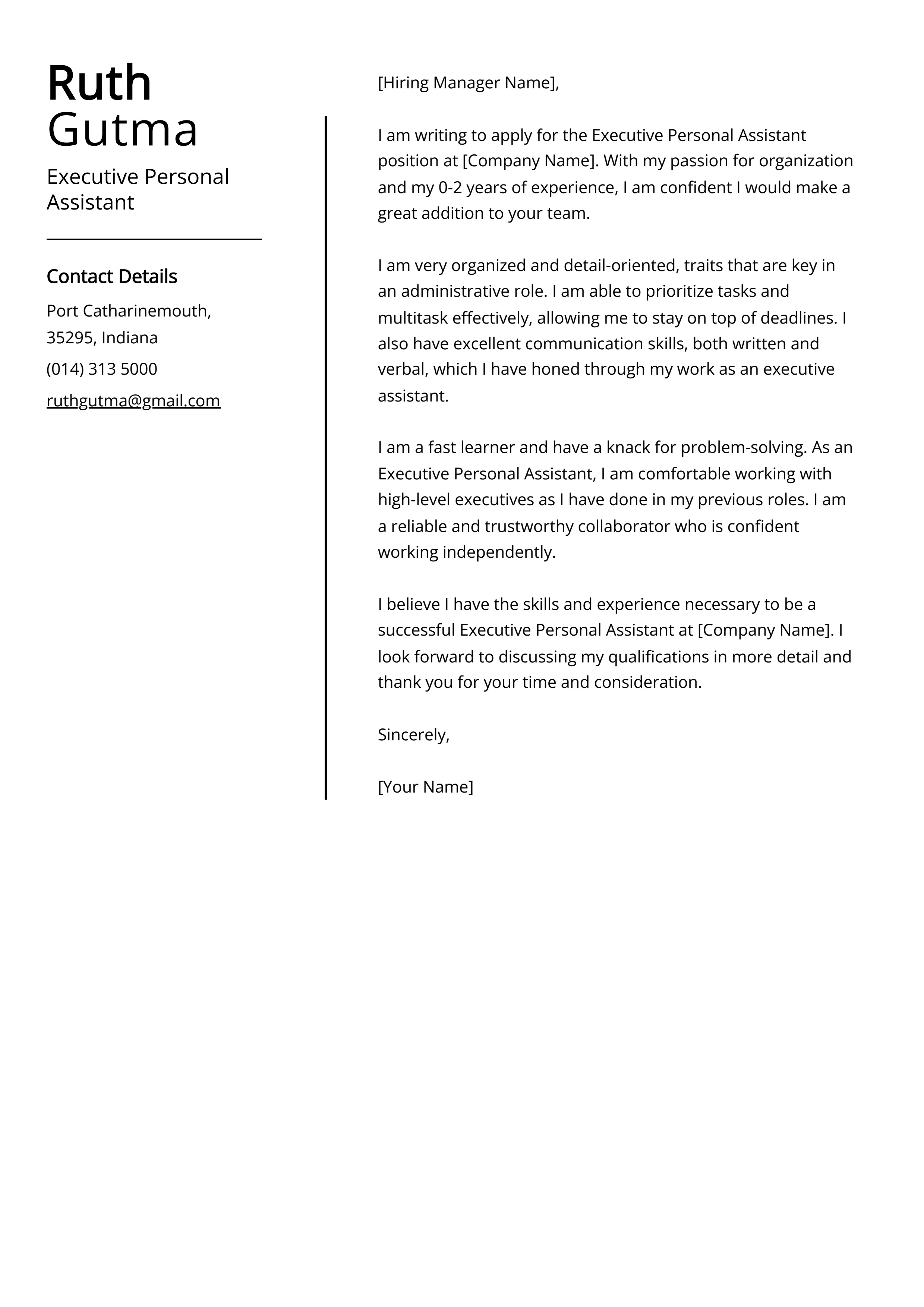
Communication proficiency is a core skill for an Entry Level EA. This includes clear and effective written communication, such as drafting emails, preparing reports, and taking meeting minutes. Verbal communication skills are equally important for answering phones, relaying messages, and interacting with visitors. Active listening skills enable the EA to understand instructions, gather information, and address concerns effectively. Strong interpersonal skills help build positive relationships with colleagues, executives, and clients. The ability to communicate professionally and respectfully, both in person and remotely, is crucial. Being able to adapt communication style to different audiences is also a key aspect of proficiency.
Organizational Skills
Organizational skills form the backbone of an EA’s role, enabling efficiency and effectiveness in managing daily tasks. The ability to create and maintain organized filing systems, both physical and digital, is essential for quick information retrieval. Calendar management involves scheduling meetings, appointments, and travel arrangements while ensuring optimal time utilization. Task prioritization ensures that the most important items are addressed first, preventing delays and bottlenecks. The skill to manage multiple projects concurrently, adhering to deadlines, requires excellent organizational abilities. An EA must maintain a structured and efficient work environment by utilizing project management tools, setting reminders, and creating checklists to ensure nothing is overlooked. A well-organized EA contributes significantly to the smooth functioning of the office.
Time Management Abilities
Time management is a critical skill for an Entry Level EA, requiring the ability to prioritize tasks, manage schedules, and meet deadlines efficiently. Effective prioritization involves identifying the most critical tasks and allocating appropriate time for completion. Calendar management ensures that appointments, meetings, and deadlines are tracked and adhered to. The ability to multitask while maintaining focus and attention to detail is essential. Setting realistic goals and breaking large projects into smaller, manageable steps helps to improve time management. Utilizing time management tools, such as planners, calendars, and to-do lists, enables the EA to stay organized and on track. A well-managed EA effectively utilizes time, ensures efficient workflow, and meets all responsibilities promptly.
Writing Your Entry Level Executive Assistant Cover Letter
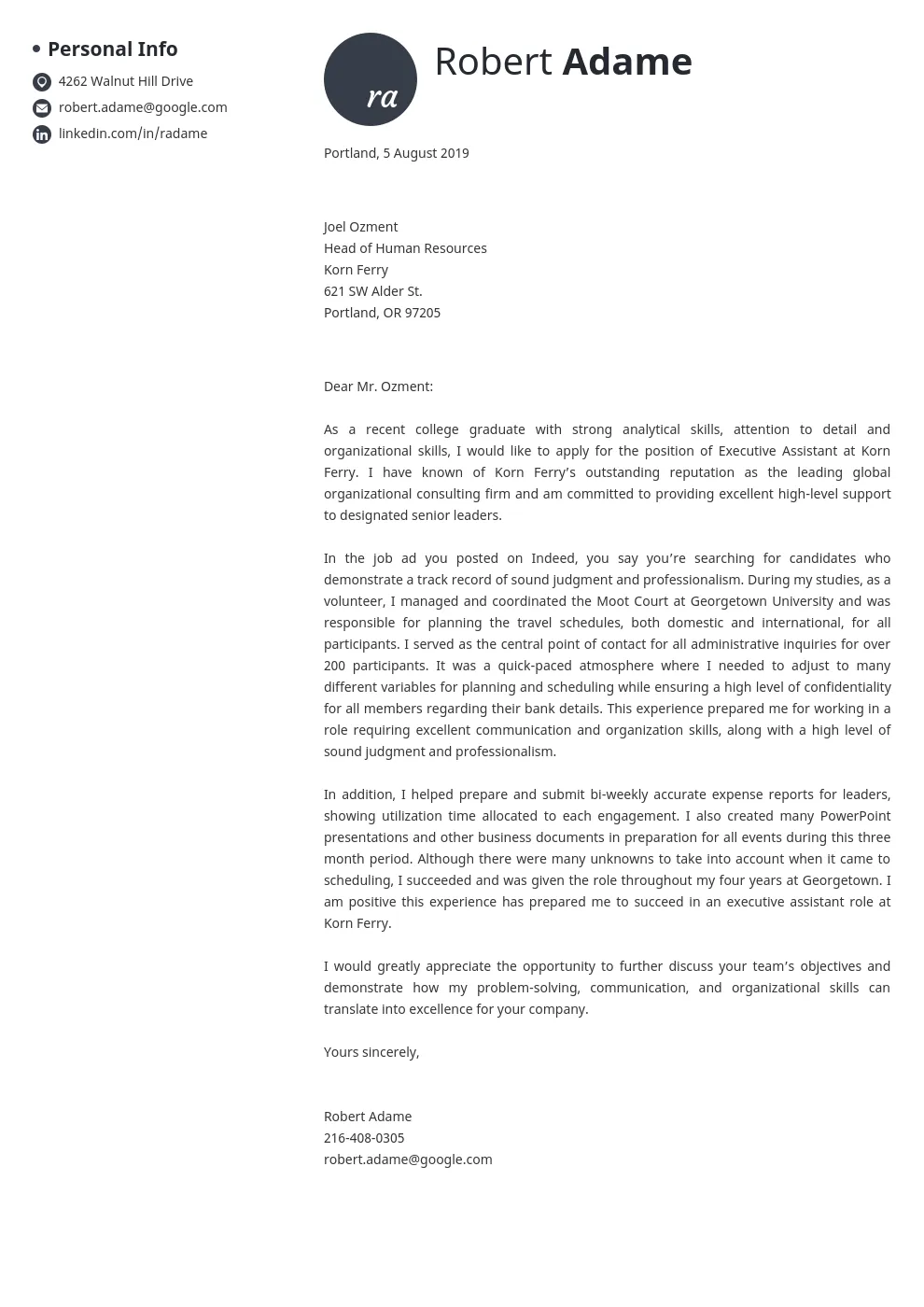
Writing an effective cover letter is critical for securing an Entry Level Executive Assistant position. Your cover letter offers a chance to introduce yourself to the hiring manager and highlight your key qualifications, skills, and experiences. The cover letter should be tailored to the specific job description, emphasizing how your abilities align with the role’s requirements. It should be well-structured, concise, and free from errors, showcasing professionalism and attention to detail. Begin with a compelling introduction that grabs the reader’s attention and clearly states the position you’re applying for. In the body of the letter, provide examples of your skills, quantifying your achievements whenever possible. Conclude with a strong call to action, expressing your interest in the position and inviting the hiring manager to contact you. The cover letter should make a compelling case for your candidacy and persuade the hiring manager to review your resume and consider you for an interview.
Header Section
The header of your cover letter is the initial visual element, and it establishes your professionalism and contact information. Begin by including your full name, address, phone number, and email address. Ensure your contact details are accurate and up-to-date. Following this, include the date and the recipient’s information, usually the hiring manager’s name, job title, and company address. If the hiring manager’s name is unavailable, use the title of the hiring manager or the department to personalize the letter. The header should be clearly formatted, easy to read, and consistent with the professional tone of the letter. This section creates a positive first impression, helping recruiters quickly identify how to contact you.
Greeting the Hiring Manager
The greeting sets the tone for your cover letter and should be personalized to show you’ve done your research. Ideally, address the hiring manager by name; use “Dear Mr./Ms. [Last Name]” to create a more personal connection. If the hiring manager’s name is not available, use a formal greeting like “Dear Hiring Manager” or “Dear [Department Name] Team.” Avoid generic greetings like “To Whom It May Concern,” as they can appear impersonal. The greeting should be professional and respectful, demonstrating your attention to detail and respect for the recipient. A well-crafted greeting makes a positive impression and encourages the reader to continue reading your cover letter. Always make sure to double-check the spelling of the hiring manager’s name.
Introduction Paragraph
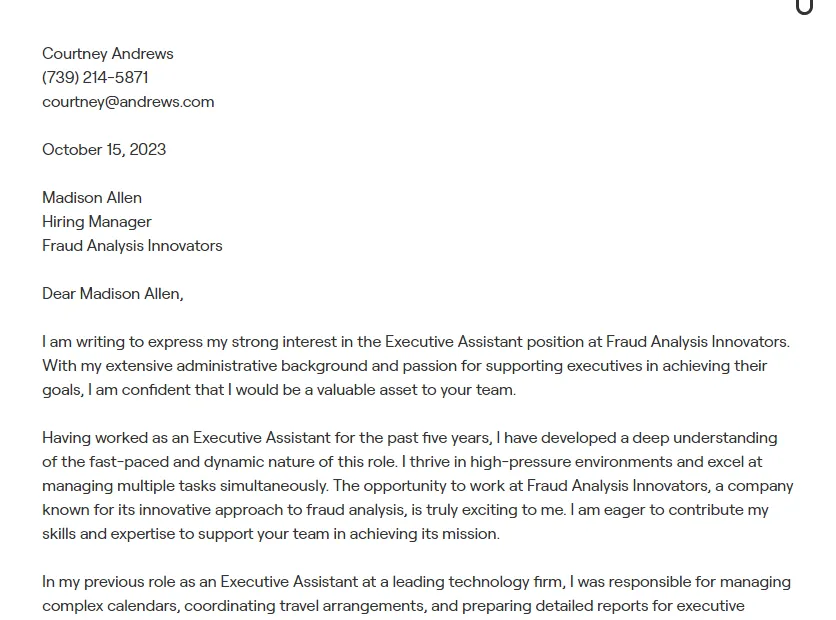
The introduction paragraph is a critical element of your cover letter, designed to capture the hiring manager’s attention and immediately indicate the purpose of your letter. Begin by clearly stating the position you are applying for and where you found the job listing. Briefly introduce yourself and your core qualifications or relevant experience that align with the job requirements. Highlight a key skill or achievement that makes you stand out from other candidates. Show enthusiasm for the position and the company, expressing your interest in contributing to their success. Keep the introduction concise, impactful, and tailored to the specific job description. The goal is to make the reader want to learn more about you and encourage them to review your resume. Crafting a strong introduction helps to ensure the hiring manager continues reading your cover letter.
Body Paragraphs Highlighting Skills and Experiences
The body paragraphs are the core of your cover letter, where you provide detailed evidence of your skills, experiences, and qualifications. In these paragraphs, address specific requirements mentioned in the job description. Provide concrete examples of how you’ve demonstrated skills such as communication, organization, and time management in previous roles or academic settings. Focus on achievements rather than just listing your responsibilities. Quantify your accomplishments whenever possible, using numbers and data to showcase your impact. Structure your paragraphs logically, using the STAR method (Situation, Task, Action, Result) or similar frameworks to tell compelling stories. Emphasize how your skills and experiences align with the company’s needs and how you can contribute to their success. Keep your writing clear, concise, and focused on the value you can bring to the role. This section is crucial for demonstrating your fit for the position.
Showcasing Your Qualifications
When showcasing your qualifications, the goal is to demonstrate that you possess the skills and experience needed to excel as an Entry Level Executive Assistant. Analyze the job description to identify the most important requirements, and then provide specific examples to prove that you meet those needs. Focus on quantifiable achievements and demonstrate what results you have delivered in previous roles. Highlight your proficiency in relevant software and tools, such as Microsoft Office Suite, calendar management applications, or other office technologies. Showcase your strong communication, organizational, and time management skills with concrete examples from your past experience. Use action verbs to describe your accomplishments and emphasize your ability to handle tasks effectively and efficiently. Tailor your examples to the company’s needs and the specific job requirements. This will make your qualifications stand out and show that you are a great fit for the position.
Quantifying Achievements
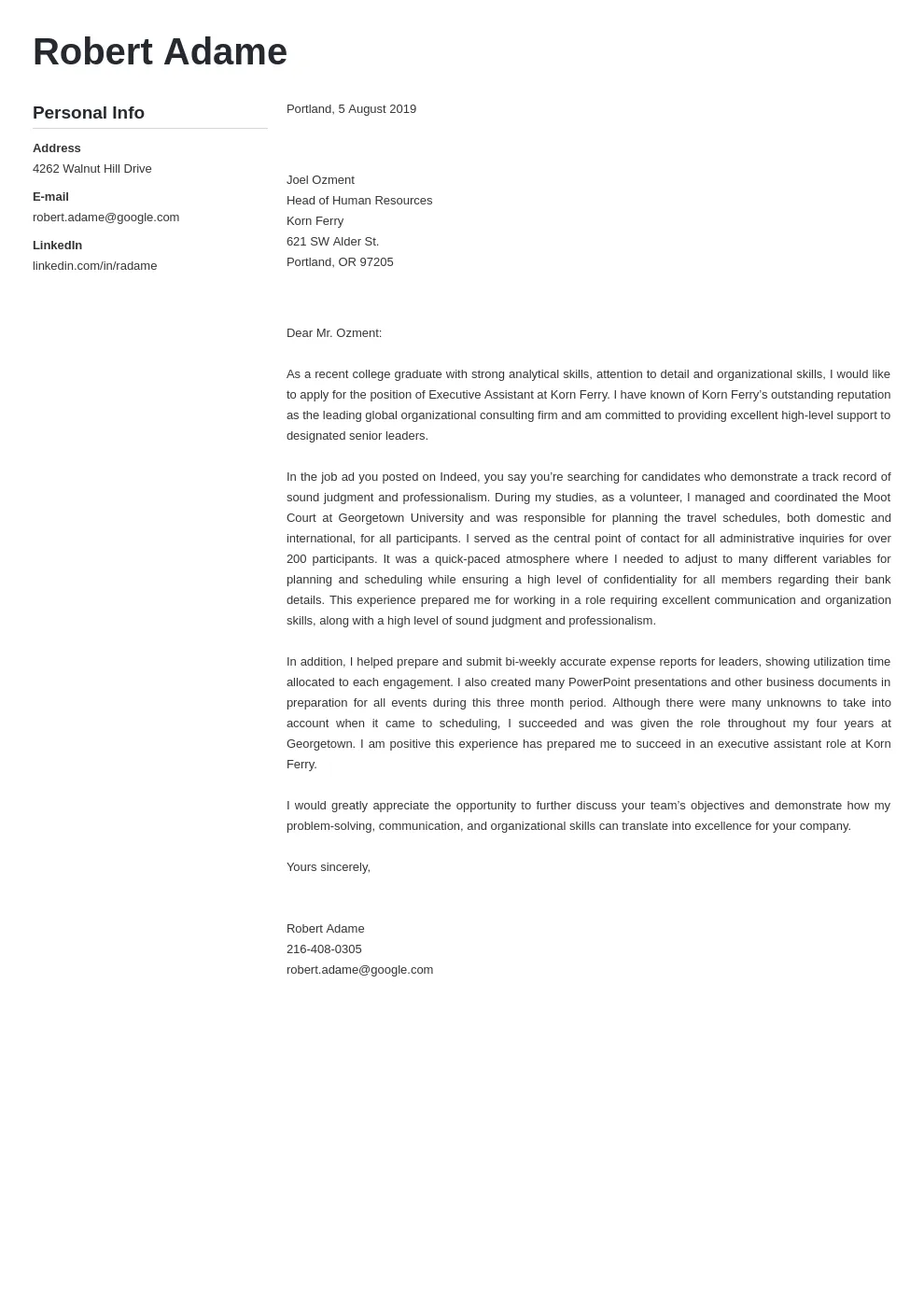
Quantifying your achievements in a cover letter makes your qualifications more tangible and impactful. Instead of just saying you improved efficiency, state the percentage by which you streamlined a process. For example, “Reduced meeting scheduling time by 20% by implementing a new scheduling tool.” Use metrics to provide concrete evidence of your accomplishments. For instance, “Managed travel arrangements for a team of 10, resulting in 100% on-time arrivals for all scheduled events.” Use numbers to showcase your skills and the value you bring to an organization. If you created an improved filing system, mention how many files you organized. Quantifying your accomplishments immediately provides tangible proof of your ability and the value you can bring to the company. This data will make your accomplishments far more convincing.
Closing Paragraph and Call to Action
The closing paragraph should reaffirm your interest in the Entry Level Executive Assistant position and clearly outline your next steps. Thank the hiring manager for their time and consideration. Reiterate your enthusiasm for the role and the company, emphasizing what attracts you to both. State your availability for an interview and include your contact information again, ensuring it is easy for them to reach you. A clear call to action is important. For instance, invite them to contact you to schedule an interview. A well-crafted closing paragraph leaves a positive impression, reiterates your interest, and ensures the hiring manager knows how to take the next step. Ensure you end your letter with a professional closing, such as “Sincerely” or “Best regards.”
Proofreading and Formatting Your Cover Letter
Proofreading and formatting are crucial steps in ensuring your cover letter is polished and professional. Carefully proofread your letter for any grammatical errors, typos, or punctuation mistakes. Read the cover letter aloud to help catch errors that you might miss when reading silently. Check for consistent formatting throughout your letter. Use a clear, easy-to-read font, such as Arial, Calibri, or Times New Roman, and maintain a consistent font size. Make sure your cover letter has adequate spacing between paragraphs and sections. Use proper margins and alignment. Ensure your letter is concise and easy to navigate, and keep it to one page. Before submitting, ask someone else to review your cover letter. A fresh pair of eyes can often catch errors that you may have missed. A well-proofread and formatted cover letter demonstrates your attention to detail and enhances your professionalism.
Essential Tips for a Standout Cover Letter
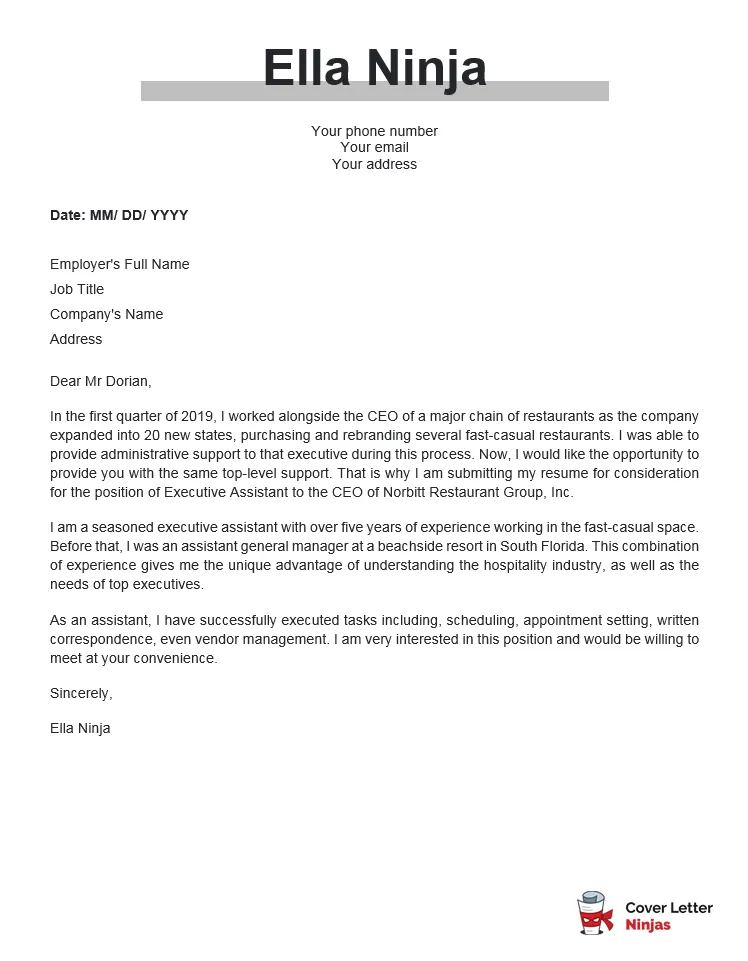
To make your cover letter stand out, tailor it to each specific job you apply for. Research the company and the role, showing that you understand their needs and values. Highlight your most relevant skills and experiences that match the requirements of the job. Use action verbs to describe your accomplishments and quantify them whenever possible. Show enthusiasm and genuine interest in the role and the company, demonstrating you are more than just a list of qualifications. Include a brief summary of your accomplishments, showing how you will add value to the team. Proofread your cover letter carefully for any errors. Always maintain a professional tone and use clear, concise language. Make sure your formatting is visually appealing and easy to read. Be positive and confident, demonstrating your belief in your abilities. A strong and personalized cover letter that follows these tips is more likely to capture the hiring manager’s attention.
Tailoring Your Cover Letter
Tailoring your cover letter is essential for making a positive impression on potential employers. Each cover letter should be customized to the specific job you are applying for and the company’s unique needs. Start by carefully reviewing the job description, identifying the key skills, qualifications, and experiences they are seeking. Use the same keywords and phrases that are used in the job posting. Highlight the experiences and achievements that directly align with these requirements, offering relevant examples from your previous work, education, or volunteer experiences. Demonstrate that you have researched the company and understand their mission, values, and culture, and explain why you want to work there. A tailored cover letter shows the hiring manager that you understand the role and have the skills and passion to excel in it. It is more effective than a generic, one-size-fits-all letter.
Formatting Best Practices
Proper formatting enhances the readability and professionalism of your cover letter. Use a clean, easy-to-read font, such as Arial, Calibri, or Times New Roman. Keep the font size between 10 and 12 points. Use consistent formatting throughout the entire letter. Maintain a consistent style with clear headings and subheadings. Use single spacing within paragraphs and double spacing between paragraphs to improve readability. Make sure the margins are 1 inch on all sides of your cover letter. Align the text to the left, and avoid center alignment. Be concise, and limit your cover letter to one page. Proofread the cover letter to remove grammatical errors, typos, and inconsistencies. Effective formatting makes a positive first impression and will keep your cover letter well organized.
Cover Letter Examples for Entry Level Executive Assistant
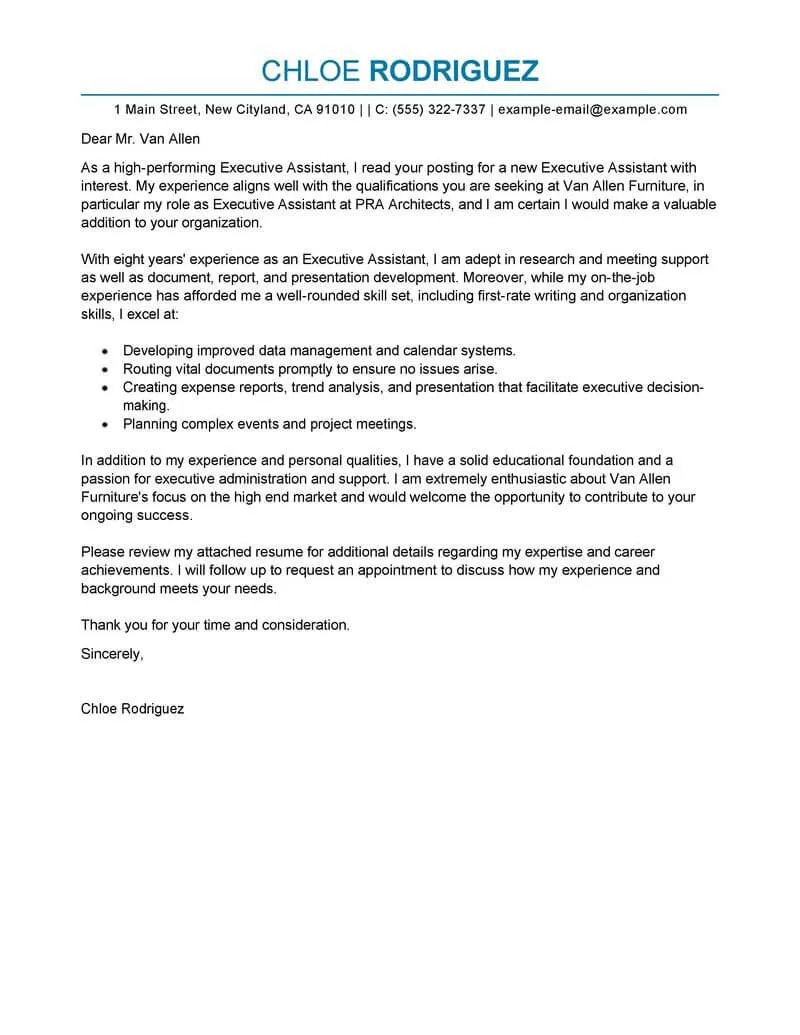
Reviewing cover letter examples provides valuable insights into effective writing styles and content structure. Look at templates that are specifically designed for Entry Level Executive Assistant positions to guide your writing process. Pay attention to how different applicants highlight their skills and experiences, using action verbs to describe their achievements. Observe how they tailor their letters to the specific job requirements and show enthusiasm for the role. Analyze how they quantify their accomplishments. Use the examples as a guide, but make sure to customize your cover letter to reflect your own unique skills, experiences, and personality. By studying these examples, you can gain insight into what works best and create a compelling cover letter that will capture the hiring manager’s attention.
